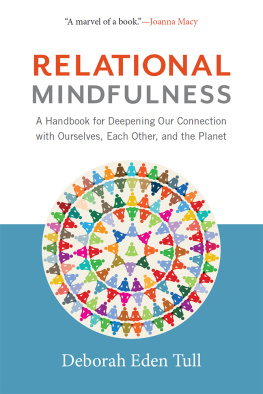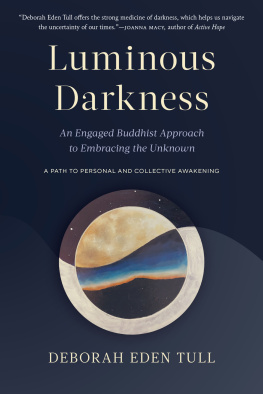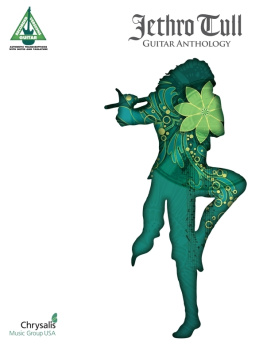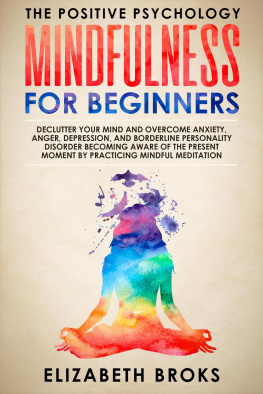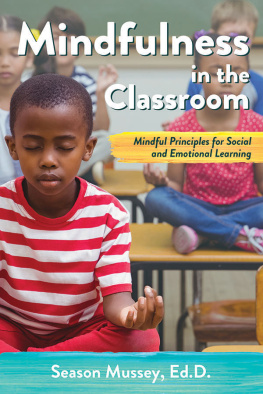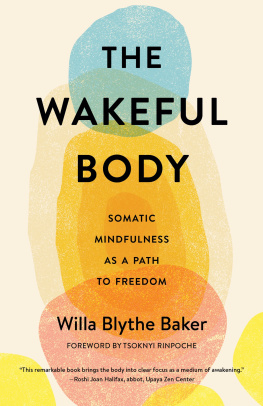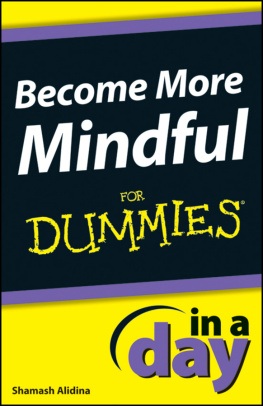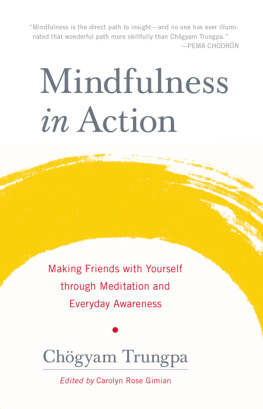
Wisdom Publications
199 Elm Street
Somerville, MA 02144 USA
wisdompubs.org
2018 Deborah Eden Tull
All rights reserved.
No part of this book may be reproduced in any form or by any means, electronic or mechanical, including photography, recording, or by any information storage and retrieval system or technologies now known or later developed, without permission in writing from the publisher.
Library of Congress Cataloging-in-Publication Data
Names: Tull, Deborah Eden, author.
Title: Relational mindfulness: a handbook for deepening our connection with ourselves, each other, and the planet / Deborah Eden Tull.
Description: Somerville: Wisdom Publications, 2018. | Includes index. | Identifiers: LCCN 2017037683 (print) | LCCN 2018003385 (ebook) | ISBN 9781614294214 (ebook) | ISBN 9781614294139 (pbk.: alk. paper)
Subjects: LCSH: Meditation. | Mindfulness (Psychology) | Awareness.
Classification: LCC BL627 (ebook) | LCC BL627 .T85 2018 (print) | DDC 204/.4dc23
LC record available at https://lccn.loc.gov/2017037683
ISBN 978-1-61429-413-9 ebook ISBN 978-1-61429-421-4
22 21 20 19 18
5 4 3 2 1
Cover design by Jim Zaccaria. Interior design by Kristin Goble. Author photo by Doug Ellis Photography.
I hold this to be the highest task for a bond between two people: that each protects the solitude of the other.Rainer Maria Rilke, Letters to a Young Poet
I dedicate this book to my beloved Mark DAquila: You have brought boundless joy to my life; I bow to the mystery that brought us together.
I offer this book for all beings of the past, present, and future. May we find the courage to meet life as students of love. May we remember the love that is who we already are.
Preface
Integrating Seven Years at a Zen Monastery
This day and age carry more uncertainty and threat to the human species and planet than humanity has ever experienced in human time. What we need now is a pathway for global healing. If Buddhism addresses this, great; if it does not, then the teachings are not relevant enough for this time.
David R. Loy
I heard these words at the International Dharma Teachers Gathering at the Omega Institute in Rhinebeck, New York, in 2015. The elder Buddhist teacher was addressing global climate change. I took this statement to heart with the full awareness that my personal practice has always, from the beginning, been merged with my commitment to activism.
Buddhism is about putting an end to dukkha , to suffering. The translation of the Pali word dukkha is subtle, incessant dissatisfaction. Years ago, I sought to address this state in myself and others by becoming a monk at a Zen Buddhist monastery.
I arrived at the monastery at the age of twenty-six, eager to address my own suffering and holding big questions about how to contribute to a more sane and peaceful world. I had grown up in the city of Los Angeles and by the age of seventeen was in despair about the state of the world I was inheriting. I had witnessed extreme poverty and social injustice alongside mass over-consumption and excess wealth, lack of reverence for our planet in the name of greed, and a level of unconsciousness, denial, and corruption in the city I lived in that seemed like madness to me.
I was hungry for answers, and so I set out on a journey that took me to city and farm and back many times; to spiritual and sustainable communities around the world; and eventually to a Zen Buddhist monastery for seven and a half years. As a student of ecological design and sustainable agriculture, my mind was blown open as I learned about the healing capacity of naturefungi to clean up oil spills, for instance, design mimicking nature to exponentially cut down on energy use and help people create more sustainable human habitats, and projects re-seeding rainforests that we thought were obliterated. It seemed obvious that if only we could get our egos out of the way, we had a chance at contributing to restoration and balance. If people could actually see, as I had, what is possible when we work with rather than against nature, I was certain they would all get on board.
As a student of meditation, giving myself permission to look within and bring awareness to my own ego, I came to understand that much of the modern world persists in an adversarial relationshipboth with human nature and with the natural world. My despair shifted into compassionate action when I understood the possibility of working with rather than against life and making every moment and every relationship an opportunity for awakening.
Within the simple and compassionate architecture of the Zen monastery, following a daily schedule of sitting and working meditation, I began to find my way back home to a more authentic way of being. I describe this as living from nonseparation or interconnection. As I began to shed my own lifes conditioning through engaged meditation practice, I realized everything I wanted and had to offer came naturally from becoming more present. The more I saw about how deeply conditioning operated in myself and in our world, perpetuating the myth of separation, the more I was determined to see through it.
My journey as a monk was not always pretty and rarely easyoften far from it. I struggled with layers of fear and the perception of inadequacy and, over the years, was forced to address personal challenges and the releasing of trauma before returning to my own sustained presence. Although I had not identified as someone who suffered from trauma, the more I observed my thoughts and emotions, the more I realized that growing up in a conditionally loving world had left the marks of severe trauma on my psyche. I had internalized the belief that only some parts of myself, and thus humanity, were acceptable, valuable, and worthy of love; and other parts of myself were notand in fact deserved criticism and punishment. Though I was not conscious of this belief system operating within me, the choice to become a monk was my hearts call to dismantle this distortion. As a result of my own personal journey, I now believe strongly that if I can take steps to wake up from delusion, anyone can. With willingness, courage, kindness, and patience, anyone can wake up from the mind of separation. To do so is our birthright.
I came from a family of artists and activists, steeped in social justice and poverty issues. By the time I became a monastic, I had been a student of and educator in sustainability for years. Until I found the Dharma, I had always felt the need to help people understand interconnection but did not have the true language for it nor did I know how to take it beyond a concept into moment-by-moment embodiment. Most people had an intellectual understanding of interdependence but were nonetheless living their lives in the paradigm of separation, not at peace with their minds, struggling daily for survival, caught in relational challenges, disconnected from the natural world and their subtle body, and seeing through the lens of other. Even in the well-intentioned world of change agents in which I was immersed, I often noticed a quality of egoic separation. Egoic separation, the tendency to perceive life through our own separate bubble, too often leads to drama, competitiveness, finger-pointing and blame, self-righteousness, burnout, and inefficiency.
During my years as a monk the more I meditated, the more I began to understand that meditation and mindfulness offer a direct means for healing the myth of separation. This is the key to both personal healing and global sustainability. Our native state is nonseparation.
Seven and a half years later, when I left the simplicity of the monastery to live and teach out in the world, my practice took on even greater dimensions. As I devoted myself to practicing in the context of the complex megatropolis of Los Angeles, I gained an even further understanding: the steadfast support of a monastic structure is something we can create inside ourselves wherever we are. This was freeing for me and holds true for all of us. We can create the necessary support for our own awakening by making a commitment to Relational Mindfulness.
Next page
